Ploughshares has returned with their much anticipated annual fiction issue, which features work from the likes of Lydia Davis and Daniel Pena, as well as some new writers coming into their own. In the introduction, Guest Editor Lauren Groff says she is “hungry for voices that speak to me with real emotion; because real emotion is always new.” One can see that influence in the latest installment, which includes a wide-range of narratives where the characters are dealing with unexpected and sometimes strange incidents that showcase little slices of humanity. Continue reading “Ploughshares – Summer 2015”
NewPages Blog
At the NewPages Blog readers and writers can catch up with their favorite literary and alternative magazines, independent and university presses, creative writing programs, and writing and literary events. Find new books, new issue announcements, contest winners, and so much more!
Ploughshares – Summer 2015
Spread the word!
The Southern Review – Summer 2015
Time Magazine once labeled The Southern Review as “superior to any other journal in the English language.” The latest edition published on the campus of the Louisiana State University lives up to the high standards that their readers love and have come to expect since the magazine’s inception in 1935. You will not regret reading this cover to cover. Continue reading “The Southern Review – Summer 2015”
Spread the word!
Chtenia – Summer 2015
The year was 1964 and Leonid Brezhnev had just taken control of the Soviet Union. Nikita Khrushchev had recently been expelled as First Secretary of the Central Committee of the Communist Party of the Soviet Union as well as Chairman of the Council of Ministers, thoroughly ending another era of autocracy in Soviet Russia and ushering in a collective leadership. Leonid Brezhnev and Alexei Kosygin took the stage to powerhouse Russian politics, and henceforth brought about the Era of Stagnation in the USSR, creating hardship and creative inspiration for citizens of the massive state. Continue reading “Chtenia – Summer 2015”
Spread the word!
Mudfish – 2015
This issue of Mudfish opens with the winner of the 11th Mudfish Poetry Prize Chosen by Charles Simic: “Waking Alone on Sunday Morning” by Elisabeth Murawski. Continue reading “Mudfish – 2015”
Spread the word!
Hippocampus – September 2015
Delving into the latest issue of Hippocampus Magazine, I was reminded of You’ve Got Mail and the moment Meg Ryan’s character is told “I remember when your mother gave me Anne of Green Gables. ‘Read it with a box of Kleenex,’ she told me.” So, readers, let me pass on the same warning before checking out the September 2015 issue of Hippocampus: grab some tissues, or at the very least, be prepared to have a lump in your throat for longer than comfortable. Continue reading “Hippocampus – September 2015”
Spread the word!
2015 Poetry Magazine Prizes Announced
Poetry magazine awards eight annual prizes for the best work published in Poetry during the past 12 months.
THE LEVINSON PRIZE $500 awarded to Rae Armantrout for her poems “The Difficulty,” “The Ether,” “Followers,” and “Taking Place” from the January 2015 issue.
THE BESS HOKIN PRIZE $1,000 awarded to Terrance Hayes for “How to Draw a Perfect Circle,” published in the December 2014 issue.
THE FREDERICK BOCK PRIZE $500 awarded to Tarfia Faizullah for “100 Bells” in the January 2015 issue.
THE J. HOWARD AND BARBARA M.J. WOOD PRIZE $5,000 awarded to Jillian Weise for her poems “Future Biometrics” and “Biohack Manifesto” in the March 2015 issue.
THE JOHN FREDERICK NIMS MEMORIAL PRIZE FOR TRANSLATION $500 awarded to Ming Di and Jennifer Stern for their translations of Liu Xia’s poems “Empty Chairs” and “Transformed Creatures” in the November 2014 issue.
THE FRIENDS OF LITERATURE PRIZE $500 awarded to Amy Newman for her poem “Howl” in the July/August 2015 issue.
THE EDITORS PRIZE FOR FEATURE ARTICLE $1,000 awarded to Jenny Zhang for her essay “How It Feels” in the July/August 2015 issue.
THE EDITORS PRIZE FOR REVIEWING $1,000 awarded to Maya Catherine Popa for “Forever Writing from Ireland,” her review of The Architect’s Dream of Winter by Billy Ramsell, This Is Yarrow by Tara Bergin, Scapegoat by Alan Gillis, and Clasp by Doireann Ní Ghríofa in the September 2015 issue.
The prizes are organized and administered by the Poetry Foundation in Chicago, publisher of Poetry magazine. Read these winning entries and browse all past issues of Poetry magazine since 1912 online.
Spread the word!
American Life in Poetry :: Robert King
American Life in Poetry: Column 546
BY TED KOOSER, U.S. POET LAUREATE
They say that when undergoing cancer treatment, the patient’s attitude is all-important. Here Robert King, a poet now living in Colorado, looks with wit and bemusement at his chemotherapy. His most recent book is Some of These Days, (Conundrum Press, 2013).
The Cancer Port
It’s called a port, a harbor, haven, home,
a city on the coast of my chest opened
for a passage into my heart—which we say
is where emotions live—and it’s embedded,
slipped into a shallow nest of flesh, a bump,
a lump under the skin on the right so
the narrow street can reach the marketplace
of the aorta, receptive to any
incoming ship, needle, boat, barge, unloading
its spices, crates of dates, barrels of poisons,
Etoposide phosphate, amethyst, amaranth,
Cisplatin, amphorae of wine and olives.
I carry it secretly under my skin
because it is easier. I carry
everything under my skin, so lightly
I barely notice, watching from the ramparts
the dangerous rocky anchorage below
where goods and evils, bundled together
and tied, arrive, waiting to be unloaded
and poured out into a welcoming country.
We do not accept unsolicited submissions. American Life in Poetry is made possible by The Poetry Foundation (www.poetryfoundation.org), publisher of Poetry magazine. It is also supported by the Department of English at the University of Nebraska-Lincoln. Poem copyright ©2015 by Robert W. King, “Embedding the Cancer Port,” from Nimrod International Journal, (58.2, 2015). Poem reprinted by permission of Robert W. King and the publisher. Introduction copyright © 2015 by The Poetry Foundation. The introduction’s author, Ted Kooser, served as United States Poet Laureate Consultant in Poetry to the Library of Congress from 2004-2006.
Spread the word!
Young Irish Poets in Poetry
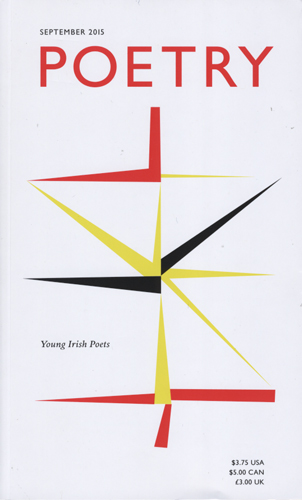 Poetry’s September 2015 issue celebrates Young Irish Poets, the first Irish-themed issue in twenty years. Editor Patrick Cotter reveals a note about the last Irish issue:
Poetry’s September 2015 issue celebrates Young Irish Poets, the first Irish-themed issue in twenty years. Editor Patrick Cotter reveals a note about the last Irish issue:
One notable difference between this issue and the Contemporary Irish Poetry issue of 1995 is how evenly women are represented. In 1995, out of forty poets and translators presented, only six were women.
Yikes. But it’s great to see a change throughout the years and have a more evenly represented section of young Irish poets in this issue.
And with the new Playlist feature on the Poetry Foundation blog, I’m hoping this issue has accompanying music available soon.
Spread the word!
Tampa Book Arts Kickstarter
 The Tampa Book Arts Studio has launched its first-ever Kickstarter campaign for a project that brings an unpublished story of notable American woodcut artist J. J. Lankes into print in a limited letterpress edition.
The Tampa Book Arts Studio has launched its first-ever Kickstarter campaign for a project that brings an unpublished story of notable American woodcut artist J. J. Lankes into print in a limited letterpress edition.
“In 1950, nearing the end of his career as an illustrator and woodcut artist, Lankes wrote an allegorical fable that takes place in the lives of two mice, a story that emphasizes the snares of materialism versus the redeeming strength of love and forgiveness. Lankes also completed two illustrations to accompany it, but both the story and the cuts were set aside. They were never published or even publicly known, and they were nearly lost.” (TBAS blog)
The TBAS is home to Lankes’s c. 1845 Hoe Washington hand press, No. 3126, on which he proofed and printed his blocks for Robert Frost and others. Now, Director Dr. Richard Mathews is overseeing theprint production of Lankes’s story, The Rich Mouse, with illustrations. The book will be set in a special casting “Village” private press typeface in celebration of the 150th anniversary of its creator, Frederic W. Goudy.
Clearly, there is much to celebrate here! And donors can get in on the celebration by contributing to the Kickstarter campaign and receiving some excellent premiums – including a limited letterpress edition of the book itself, broadsides, and a companion paperback copy The Rich Mouse.
Spread the word!
Glimmer Train June Fiction Open Winners :: 2015
Glimmer Train has just chosen the winning stories for their June Fiction Open competition. This competition is held twice a year. Stories generally range from 2000-6000 words, though up to 20,000 is fine. The next Fiction Open will take place in December. Glimmer Train’s monthly submission calendar may be viewed here.
 First place: Caleb Leisure [pictured], of Martinez, CA, wins $2500 for “Atlantic on Sunday.” His story will be published in Issue 97 of Glimmer Train Stories.
First place: Caleb Leisure [pictured], of Martinez, CA, wins $2500 for “Atlantic on Sunday.” His story will be published in Issue 97 of Glimmer Train Stories.
Second place: Steven Polansky, of Appleton, WI, wins $1000 for “Obsequies” and publication in a future issue of Glimmer Train Stories.
Third place: Andrew Robinson, of Singapore, wins $600 for “Greater Love.” His story will also be published in a future issue of Glimmer Train Stories, increasing his prize to $700.
A PDF of the Top 25 winners can be found here.
Spread the word!
Changes at Arroyo
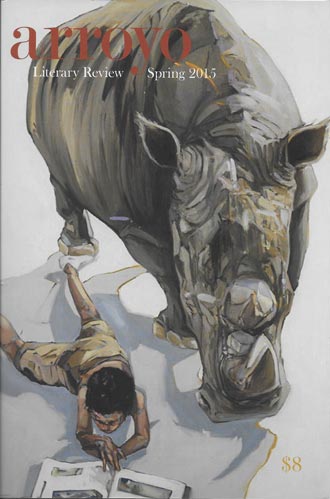 Arroyo presents their first drama piece in their Spring 2015 issue: “Creation of Myself” written by the Costa Rican epic poet, Eunice Odio, and translated by Keith Ekiss. From The Fire’s Journey, a four-part epic poem, the selection follows poet-hero Ion as he prepares to enter the world.
Arroyo presents their first drama piece in their Spring 2015 issue: “Creation of Myself” written by the Costa Rican epic poet, Eunice Odio, and translated by Keith Ekiss. From The Fire’s Journey, a four-part epic poem, the selection follows poet-hero Ion as he prepares to enter the world.
The issue with this “first” for Arroyo also brings around a “last.” Editor Christopher Morgan says good-bye in his Editor’s Note, and Lenae Souza will be stepping in as Editor for Issue 8, set to come out in Spring 2016.
Spread the word!
Committing Theft with Tin House Issue 65
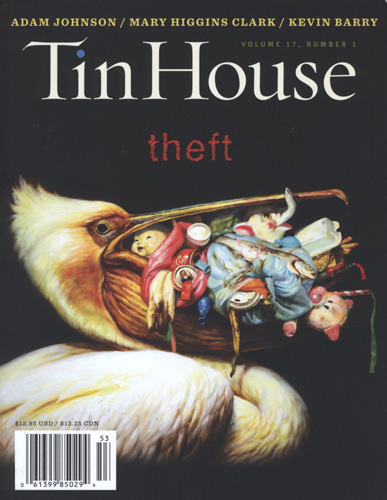 The newest issue of Tin House focuses on the theme of Theft. Kevin Young “looks at how thievery is done well (Bob Dylan) and not so well (Jonah Lehrer).” Mary Ruefle and Erika Metiner take and take apart writing in their erasure poetry and Sarah Dohrmann revisits the 1982 kidnapping of John David Gosch.
The newest issue of Tin House focuses on the theme of Theft. Kevin Young “looks at how thievery is done well (Bob Dylan) and not so well (Jonah Lehrer).” Mary Ruefle and Erika Metiner take and take apart writing in their erasure poetry and Sarah Dohrmann revisits the 1982 kidnapping of John David Gosch.
From the editor’s note:
We sent out a call for short essays about memorable thefts, and it is an honor to have the call answered by the doyen of crime writers, Mary Higgins Clark, alongside Alissa Nutting, George Singleton, and Laura Lippman.
And it’s only appropriate that Martin Wittfooth’s “Loot Bag” dons the cover of this issue: a pelican with its bill filled with the stolen treasures of trash and childhood toys.
Spread the word!
Story’s Monsters
 Story’s second print issue is themed “The Monsters.” The double-sided issue feels like a literary preparation for Halloween, from Lincoln Michel’s horror-ified authors and Dorothy Tse’s “Woman Fish” on Side A, to the Tastoane masks of Corinne Lee’s essay “Kissing the Monster” on Side B.
Story’s second print issue is themed “The Monsters.” The double-sided issue feels like a literary preparation for Halloween, from Lincoln Michel’s horror-ified authors and Dorothy Tse’s “Woman Fish” on Side A, to the Tastoane masks of Corinne Lee’s essay “Kissing the Monster” on Side B.
Allison Campbell edits the Hybrid Poetry portfolio on Side B and says, “Inside are works of art with two minds but, essentially one body. They create a new space between image and word, and ask to be experience with slight divisions of mind but unity of sense,” the mythological two-headed snake Amphisbaena brought to life and wrapping up the issue. Pick up a copy and get a little creeped out, or head over to the Story website for online content.
Spread the word!
Prayers for the Living
Prayers for the Living is a sprawling novel, a family epic. Written by the late Alan Cheuse, who was a commentator for NPR, his vast conversational experience is apparent throughout the book, which is told through conversation, narrated by a woman named Minnie Bloch, who chronicles the life of her grandson, Manny, and his joys, his struggles, and his demons. Continue reading “Prayers for the Living”
Spread the word!
Illocality
Joseph Massey mentions in the refreshingly spare notes of his fourth collection Illocality that he first encountered his title word in the Emily Dickinson poem “A nearness to Tremendousness.” Dickinson is an apt predecessor for a poet of such deliberate cerebralness. Yet, for his fine command of image, so is William Carlos Williams, or any number of Asian short-form poets. Indeed it is the relationship between logic and image, mind and world, that drives these poems so evenly through their inquiries, that most characterizes their productive tensions. “We think / ourselves here,” Massey writes to close the opening poem “Parse.” Continue reading “Illocality”
Spread the word!
The Guilty
The Guilty by Juan Villoro is the only book of fiction translated into English by this Mexican writer of short stories, novels, plays, essays, and screen scripts. He has been given the Herralde Award in Spain, the Anton Artaud award in France and short-listed for the Reezzori Prize in Italy. In this book of short stories, the individual is in the new global world order, navigating the culture of signs, copies, media, and signifiers of commercial production. Each story is told from a first person point of view, but the “I” does not belong to a specific character with a name, the “I” a transient “I” living in the world through image-manufactured phenomena. Continue reading “The Guilty”
Spread the word!
Love, Sex, and 4-H
I hate sewing. My mother loves it. To save money during my elementary and middle school years, I wore several of her handmade outfits enduring the shaming glances of classmates who, by the mid-80s, were sporting Guess jeans and Ralph Lauren t-shirts. Unlike Oomen’s adolescent experience, 4-H was less cool during mine, nevertheless, my mother enrolled me in a local club at age eleven so I could learn to make my own skirts and, to this day, I can sew a wicked tunnel stitch (though I seldom find good reason to exercise this skill). Continue reading “Love, Sex, and 4-H”
Spread the word!
1001 Facts of Prehistoric Life
You might want to bone up on the Arabian Nights stories, particularly Scheherazade and her sister Dinarzade’s tale, before delving into Jo Ann Clark’s poetic take on the siblings. In 1001 Facts of Prehistoric Life, Clark’s first book, she mixes the fable with some prehistoric fellows and a dash of mythology to present a really interesting set of works. Confession: I had to look up some words, such as viviparity, monotreme, Hypohippus, Merychippus, and mokoro. But once that was in order, a second reading of Clark’s book brought it to life. Continue reading “1001 Facts of Prehistoric Life”
Spread the word!
One Morning—
Wolff’s One Morning— sat in my possession in a very raw state. The captivating parts of the poems were laid out and exposed. It was easy to see the mechanics and the utility of every phoneme and word. This is a highly refined piece of work from a woman very much in control of her craft. The level of Rebecca Wolff’s control shines through in the entire piece. There is juxtaposition in each sentence and stanza. “Traveller, / Your journey has been long // and sectional.” Those introductory lines in “Arcadia (et in . . . est)” bear the weight of repetition. They are full of heart and compassion, yet still quite cerebral. There are always dualities to be explored and explained. Wolff demonstrates the relation between the two as often as she can locate it: “By night everything seems impossible // By day, by extension, everything: possible.” Continue reading “One Morning—”
Spread the word!
Sentences and Rain
Elaine Equi’s latest book, Sentences and Rain, feels like a confident drift. There is so much control and purpose in the playful word ideas. She must be listed among many of the greats. The insights into humanity that are contained in each and every poem remind the reader of the wonder tucked in every corner of life. The words and format are gentle and full of utility. This is the way of those who hold the passage. Equi has pushed her pen for many years. The development is original and organic. One need not read Equi’s previous writing to get the impression that this is a writer and an observer of life in the peak of their critique. Continue reading “Sentences and Rain”
Spread the word!
Everywhere Stories
The world seems bigger than what it is. The twenty pieces of short fiction in Everywhere Stories reminds us of this as it closes the gap between countries and cultures, successfully condensing 24,901 miles into a 234 page book. Forget language barriers, plane tickets for the price of a new car, or time constraints—it’s possible to travel the world without ever leaving the comfort of your favorite reading nook. Continue reading “Everywhere Stories”
Spread the word!
Books :: Able Muse Book Award
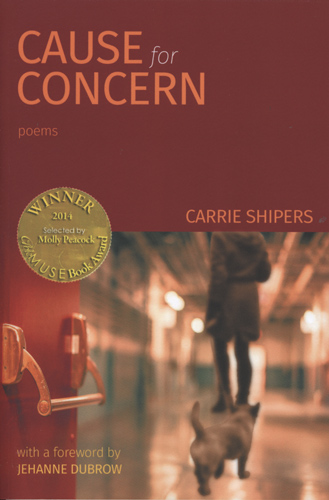 Winner of the 2014 Able Muse Book Award, Cause for Concern by Carrie Shipers is now available. From the publisher’s website: “Full of incisive meditations on frailties and fortitude often delivered with visceral honesty, Cause for Concern is spellbinding from start to finish.”
Winner of the 2014 Able Muse Book Award, Cause for Concern by Carrie Shipers is now available. From the publisher’s website: “Full of incisive meditations on frailties and fortitude often delivered with visceral honesty, Cause for Concern is spellbinding from start to finish.”
Order a print or digital copy of Cause for Concern from Able Muse’s website.
Spread the word!
The Modern Dickens Project
The Modern Dickens Project starts by posting an opening chapter online then invites other writers to continue the story by submitting the next chapter in the developing story month-by-month for the next twelve months, resulting in a thirteen chapter book. The curators behind this project are Chris Draper, Executive Director; Rachel Vogel, Managing Editor; Kali Van Baale, Editorial Advisor; Tracey Kelley and Murl Pace, Editorial Board.
Starting in 2011, the project posts a starting chapter by an established guest author, wetting the “tone and style of the following chapters.” While supported by the Iowa Arts Council, submissions are open to all writers; however, the overall story “must be distinctively Iowan.”
Submissions are due by the 21 of each month with the winning chapter selected and published online by the first of the next month to keep the story contributions going.
Previous Modern Dickens Project books are The Devil is Done Sinning, Defining Darrell, and Woman, Regardless. Each is available in paperback and kindle formats.
Spread the word!
Able Muse 2015 Winners
Able Muse is pleased to announce the winners of the Write Prize for poetry & fiction. The winning writer and the winning poet will each receive a $500 prize.
Write Prize for Fiction
Final Judge: Eugenia Kim
Winner: Andrea Witzke Slot – “After Reading the News Story of a Woman Who Attempted to Carry Her Dead Baby onto an Airplane”
Here is what Eugenia Kim has to say about Andrea Witzke Slot’s winning story: The first line of this story presents a character, setting and situation with a rare and satisfying command of storytelling. Using perfect details balanced against rapid pacing, the voice of this writing has an air of stern and simple elegance, and reveals how the narrator’s experience of a newspaper story becomes a parallel challenge to her own ambivalence about motherhood and love. In the way that great stories open larger questions, within its brief timeframe this story questions culture and society, and how we are so quick and sure to judge the tragedies of others, yet with less capacity to examine the perils in our own judgments.
Honorable Mention
James Cooper – “Strangers on a Cliff”
Albert Liau – “With the Clarity of Hindsight”
Shortlist
Scott Sharpe – “Dance Among the Dogwoods”
* * * *
Write Prize for Poetry
Final Judge: H.L. Hix
Winner: Elise Hempel – “Cathedral Peppersauce”
Here is what H.L. Hix has to say about Elise Hempel’s winning poem: The formal qualities of “Cathedral Peppersauce” are elegant: slant rhymes throughout, until the final couplet clicks the poem closed with a perfect rhyme. Even more elegant, though, is the poem’s way of grasping the beauty of its subject, by looking simultaneously at the bottle and through it into history, from which it recuperates, through sympathy and particularity, a life lost long ago.
Finalists
Elise Hempel – “Jockey”
Jeanne Wagner – “On Watching a Cascade Commercial”
Shortlist
Jim Bartruff – “Meditation on the Wake of the Winslow Ferry”
Midge Goldberg – “On Learning the Harvest Moon Is an Optical Illusion”
Trish Lindsey Jaggers – “Jaybirds Feeding on Robins”
Miriam O’Neal – “Bottle Journal ? Meditation on Transformation”
Gabriel Spera – “Blessed”
Marty Steyer – “The King of Lightning”
M.K. Sukach – “About an Alligator”
Spread the word!
Some Literary News Links :: August 2015
David Ulin and Carolyn Kellogg offer readers 10 ways to explore the complicated legacy of Watts through literature on the LA Times Jacket Copy.
Philip N. Meyer, professor at Vermont Law School and author of Storytelling for Lawyers, on How trials are more like plot-driven movies than character-driven novels.
Writer and activist Omer Aziz takes a look at What novels teacher us about life on the Huffington Post.
And several lists to support the need to read:
Top ten most chosen ‘must-reads’ by teachers
8 classic novels that will make you a better leader
President Obama’s Summer Reading List
Spread the word!
2016 Centenary Ireland’s Easter Rising
 It’s a great time for fans of Yeats to plan a visit to Ireland as 2016 marks the centenary of Ireland’s 1916 Easter Rising, a key moment on Ireland’s path to independence. Programs are planned throughout the year in seven areas: State Ceremonial; Historical Reflection; An Teanga Bheo (The Living Language(; Youth and Imagination; Cultural Expression; Community Participation; and Global and Diaspora. In addition, the government is “providing enhanced visitor experiences and access to important locations related to the Rising or to events and people of that time,” such as the GPO Interpretative Center, Richmond Barracks, National Concert Hall, Military Archives and more. The website has a PDF download of the events planned as well as regular updates online.
It’s a great time for fans of Yeats to plan a visit to Ireland as 2016 marks the centenary of Ireland’s 1916 Easter Rising, a key moment on Ireland’s path to independence. Programs are planned throughout the year in seven areas: State Ceremonial; Historical Reflection; An Teanga Bheo (The Living Language(; Youth and Imagination; Cultural Expression; Community Participation; and Global and Diaspora. In addition, the government is “providing enhanced visitor experiences and access to important locations related to the Rising or to events and people of that time,” such as the GPO Interpretative Center, Richmond Barracks, National Concert Hall, Military Archives and more. The website has a PDF download of the events planned as well as regular updates online.
The Poetry Foundation has a full entry on William Butler Yeats’ “Easter, 1916” in which Ange Mlinko explores “how the conflict of a nation was camptuerd by a plitically reluctant poet.”
Spread the word!
Brick – Summer 2015
Brick is a biannual magazine based in Toronto, Canada, with many of the contributors living in Toronto or elsewhere in Canada. Undeniably, then, Brick has a Canadian slant. Continue reading “Brick – Summer 2015”
Spread the word!
The Chattahoochee Review – Spring 2015
The Chattahoochee Review is published quarterly in paperback by Georgia Perimeter College, located in Decatur, near Atlanta. According to their website, “our roots are in the South,” but the review publishes work from all over the world, in all genres. Continue reading “The Chattahoochee Review – Spring 2015”
Spread the word!
6×6 – Summer 2015
6X6 #32 begins with Lyn Hejinian’s “Illogically; Grievous,” a lengthy prose poem that ventures to ask “Where rest the increments of a human being’s life that’s not now soot in a circle?” It’s an apt place to begin the Summer 2015 issue, which reminds readers that we are small. Our lives are short. Our memories are mortal. And while the editors likely didn’t set out with the purpose of making readers feel inconsequential, there is a common (and often comforting) vein of self-awareness running through the issue. Continue reading “6×6 – Summer 2015”
Spread the word!
Ecotone – Spring 2015
In 2005, Ecotone was created at UNC-Wilmington with the vision of “reimagining place.” Now in its nineteenth edition, the magazine has successfully navigated the literary landscape for a decade and continues to build on that original motive. In honor of the journal’s tenth anniversary, the Editorial team wanted to further explore its obsession with the “literal interpretations of place and explorations of the transition zones that defines us,” and investigate this in their art. The result of this lasting curiosity is a special issue that celebrates this natural human experience, and brings readers closer to the words on the page. Continue reading “Ecotone – Spring 2015”
Spread the word!
The Kenyon Review – July/August 2015
Despite a couple brief hiatuses throughout its long history to stabilize the journal’s financial situation, The Kenyon Review remains a staple in the literary world and consistently publishes first-rate material. Many prominent writers have been featured over the years, from Flannery O’Connor to Robert Lowell. In this issue, there is fiction from Laura van den Berg, poems from Natalie Eilbert, and an essay by Floyd Collins, among others. The pieces go in many directions, but they tend to share the theme of the characters discovering more about themselves and the surrounding world. Continue reading “The Kenyon Review – July/August 2015”
Spread the word!
Hayden’s Ferry Review – Spring/Summer 2015
How do you define chaos? Perhaps as a series of simultaneously occurring events tossing ripples into reality’s pond? Trying to love someone who wants to change every aspect of your existence? Finding purpose in a traveling circus, performing death-defying stunts? Continue reading “Hayden’s Ferry Review – Spring/Summer 2015”
Spread the word!
Carve Magazine – Spring 2015
On the outside, Carve appears to be another waiting room read. Typically, literary reviews are thick and novel-esque. Not Carve. It’s thin (only 50 pages) and non-threatening. Cutesy, but attention-grabbing, vector art garnishes its glossy cover, embodying the literal definition of “magazine.” A rarity in form, I grabbed Carve before any other magazine in the pile. Continue reading “Carve Magazine – Spring 2015”
Spread the word!
Valley Voices – Spring 2015
There are voices that are almost always overshadowed despite that their histories are embedded in our nation’s roots. Centered on the glossy cover of Valley Voices is Margaret Bowland’s painting of a young, black girl—her brown skin thinly painted white. Her attire consists of a white dress, blood spattered against a garden of white roses and cotton blooms. Ahead of her, beyond the splashes of red, a turquoise blue land, perhaps a more promising place. With her face turned almost completely towards me, and hopeful, she leads me there into that place to listen to the voices that I so rarely get to hear. Continue reading “Valley Voices – Spring 2015”
Spread the word!
Arcadia – Spring 2015
This issue of Arcadia starts off with the fiction piece “All the Women, Disappear” by Jonathan Durbin. In this short piece, the narrator describes his or her past relationships with different women. Without bogging down the reader with a multitude of details, the narrator creates vivid images of each character using each woman’s particular quirks, from Molly who “called the office so much my assistant rated her anxiety by the tone of her voice,” to Morgan who “read the front section of New York Times every day, cover to cover, while her parents were splitting up.” The ambiguity of the narrator also adds depth as the reader is unsure of the narrator’s gender, learning less about the main character of the story, than the past girlfriends. Continue reading “Arcadia – Spring 2015”
Spread the word!
Gulf Coast – Summer/Fall 2015
This issue of Gulf Coast opens with the 2014 winner of the Gulf Coast Prize in Translation. The winning translation is a series of poems by Marcelo Morales, translated from Spanish to English by Kristin Dykstra. The first poem “36” explores the ways in which “presence” is felt within us: “[ . . . ] a river of the unemployed. The way in which terror functions, the constant stippling of fear within you.” Continue reading “Gulf Coast – Summer/Fall 2015”
Spread the word!
Event – Spring/Summer 2015
The Spring/Summer issue of EVENT is a particularly exciting read because it is the “Notes on Writing” issue. Not only does the journal provide a spectrum of poetry, fiction, nonfiction, and reviews, but it also provides reflective commentary on the creative writing process that is valuable for all but the most experienced writers. Continue reading “Event – Spring/Summer 2015”
Spread the word!
Chagrin River Review – Spring 2015
I’m not sure what I was expecting when I began reading Chagrin River Review. Perhaps the multicolored cover featuring a light dangling above a spray-painted wall convinced me I was getting into something a little brighter than what I found in this issue’s fiction. While not the sunniest magazine I could’ve chosen, I was left feeling anything but disappointed. Continue reading “Chagrin River Review – Spring 2015”
Spread the word!
The Gold Man Review – 2015
If you are looking for consistency in content, do not look to The Gold Man. This is clearly a group of editors who have not settled into deciding that “this one” is only what their journal will publish when it comes to genre style. And readers looking for a variety of what’s new in contemporary writing—all in one neat package—should appreciate that. Continue reading “The Gold Man Review – 2015”
Spread the word!
Santa Clara Review – Winter 2015
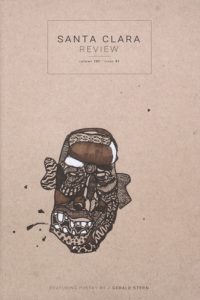
Editor in Chief Jake Lans challenges readers to disagree with what this issue of Santa Clara Review “says” in its presentation of diverse content. “It would be so boring if you didn’t,” he prods. Would if I could, but because I appreciate the variety of what’s published here, even if not all of it suits me, I can only agree with Lans. Diversity of content in any publication is essential—it would be so boring if it wasn’t!
Continue reading “Santa Clara Review – Winter 2015”Spread the word!
Chariton Review – Spring 2015
Doesn’t everybody just love a winner? Especially when it comes to reading the winning entries of a writing contest published in a journal’s newest issue. Chariton Review’s Spring 2015 issue starts off with the winner and finalists of their short fiction prize, judged by Christine Sneed. And, let’s be honest: the reason we love these as readers (and maybe writers ourselves) is because we want to see if we agree with the judge! Continue reading “Chariton Review – Spring 2015”
Spread the word!
The Meadow 2015 Novella Prize Winner
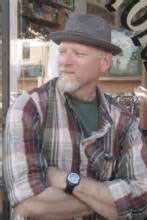 The 2015 annual issue of The Meadow features the winner of their 2015 Novella Prize: “Still Life” by Jerry D. Mathes II.
The 2015 annual issue of The Meadow features the winner of their 2015 Novella Prize: “Still Life” by Jerry D. Mathes II.
The Novella Prize is open until December 15 for previously unpublished manuscripts between 18,000 and 35,000 words. The winner receives $500 and publication in the print journal as well as online. The judge for 2015 has not yet been announced. For more information, visit The Meadow website.
Spread the word!
New Madrid Anniversary
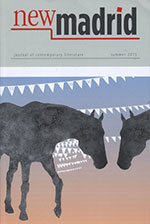 Happy 10th Anniversary to New Madrid, the national journal of the low-residency MFA program at Murray State University. In her Editor’s Introduction, Ann Neelon takes a look back, noting that “as milestones go, a decade is not insignificant, especially for a low-residency program like ours that operates, within the university budget, according to a make-or break financial model much like that of a small business.”
Happy 10th Anniversary to New Madrid, the national journal of the low-residency MFA program at Murray State University. In her Editor’s Introduction, Ann Neelon takes a look back, noting that “as milestones go, a decade is not insignificant, especially for a low-residency program like ours that operates, within the university budget, according to a make-or break financial model much like that of a small business.”
In looking to the future, Neelon resolves to “keep getting better,” with plans underway “to start up a literature option in Ireland. April 2016 marks the centenary of the rebellion immortalized by William Butler Yeats in his poem, ‘Easter, 1916.’ and our plan is to take advantage of the many exhibits and events the government of Ireland has planned in commemoration. Our first study-abroad course, to be offered in June of 2016, will use the Easter Rising as a lens through which to examine the entanglement of literature, history, and politics. The course will be open to alumni as well as current students.”
Spread the word!
Lee Gutkind on Waiting
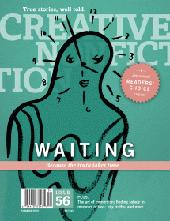 Issue 59 of Creative Nonfiction is themed Waiting. In his editorial, “What’s the Story?” Lee Gutkind examines many of his own experiences with waiting – as an editor, as a writer, as a coffee consumer. He also considers the role he plays in the lives of others and their waiting to hear about submissions they’ve sent in to CNF, that process, and why there is so much waiting for others to do.
Issue 59 of Creative Nonfiction is themed Waiting. In his editorial, “What’s the Story?” Lee Gutkind examines many of his own experiences with waiting – as an editor, as a writer, as a coffee consumer. He also considers the role he plays in the lives of others and their waiting to hear about submissions they’ve sent in to CNF, that process, and why there is so much waiting for others to do.The word waiting appears 35 times in the 1000-word essay, and while I can empathize with the frustrations shared with each recounting, there’s also something oddly humorous about it – most likely because it’s not me doing the waiting. But I certainly know the experience of waiting at Starbucks only to be next in line behind the guy who “asked the barista twenty questions about the breakfast choices and the oatmeal toppings.”
This issue also includes the essay “Any Given Day” by Judith Kitchen, submitted specifically for this issue prior to her passing August 20, 2014, and the essay “A Genre by Any Other Name?: The Story Behind ‘Creative Nonfiction” by Dinty W. Moore. Gutkind’s and Moore’s essays can be read online as well as “Sleepless in Any City: Insomnia in Lorca’s Madrid” by Janine Zeitlin for readers to get a sample of the publication’s content.
Spread the word!
Malahat Review on Long Form Poetry
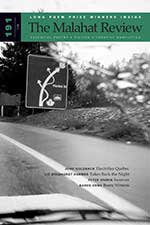 The Malahat Review issue 191 includes winners of their 2015 Long Poem Prize: Gary Geddes for “The Resumption of Play” and Genevieve Lehr for “The latter half of the third quarter of the waning moon.”
The Malahat Review issue 191 includes winners of their 2015 Long Poem Prize: Gary Geddes for “The Resumption of Play” and Genevieve Lehr for “The latter half of the third quarter of the waning moon.”
The Malahat Review website features and interview with each author on their winning poems as well as a link to a symposium on the Long Form which was presented at the League of Canadian Poets’ Long Poem panel May 2015 annual general meeting in Winnipeg. Contributing authors and commentaries include: Kate Braid’s “Tending the Garden: The Fruits and Dangers of the Long Poem”; Cornelia Hoogland’s “The Long Poem and the Shape of the Working Mind”; and Sharon Thesen’s “After-Thoughts on the Long Poem.”
Spread the word!
Cash Award for Parenting Artists
The 2015 round is now open for the Sustainable Arts Foundation. The foundation offers awards in two major categories: visual arts and writing. Writers working in fiction, nonfiction, playwriting, and poetry are endouraged to apply. Visual artists practicing painting, sculpture, drawing, printmaking, mixed-media and photography are encouraged to apply. At this time they are not accepting applications in the performing arts, film/video, or music.
To be eligible, the applicant must have at least one child under the age of 18. The foundation will award Sustainable Arts Foundation Award: $6,000 and Sustainable Arts Foundation Promise Award: $2,000. They typically offer five of each award in each application round.
There is a $15 application fee, but 100% of the fee goes to the jurors, who are also fellow parent artists themselves. Deadline September 4, 2015.
Spread the word!
Mr. and Mrs. Doctor
The back cover of this book will give readers the most bare-bone details of Mr. and Mrs. Doctor; that Job and Ifi are a Nigerian couple in an arranged marriage, that Job, “Mr. Doctor,” isn’t actually a doctor, and that this lie puts a strain on their marriage and their life at large. But Julie Iromuanya’s novel is about more than a struggle to keep up appearances. It delves into the nitty gritty details of a culture, a marriage, two people unto themselves, displaced in a strange land that is famed to provide opportunity and riches. From the very first pages, it is painfully clear that this life is not what either Job or Ifi had pictured for themselves. Continue reading “Mr. and Mrs. Doctor”
Spread the word!
The Country Road
Kurt Beals’s award winning translation of Swiss short story writer Regina Ullmann’s 1921 The Country Road will appeal mostly to mature readers who find themselves uncomfortable in contemporary fiction, seeking instead something old-fashioned. This is a different collection, unlike any short stories written today, more like vignettes, reveries, or sketches of rural peasant life in small villages, not grim but also not sentimental. It is not a page-turner; the reader will want to savor the beautiful prose and insights into human nature. Plot and character development are minimal, motivation and “backstory” in all but one case not given, lending a sense of mystery to the account. A repeated stylistic series of dots or ellipses suggests the steady continuum of life. Continue reading “The Country Road”
Spread the word!
The Blue Girl
A girl with blue skin is found drowning in a lake. A fifteen-year-old girl named Audrey saves her. Audrey’s mother, Irene, stands by. So do Irene’s friends, Magda and Libby. So do Audrey’s friends, Rebecca and Caroline. Audrey is the only one who acts; the rest of them watch. Audrey isn’t only the one who saved The Blue Girl, which is a remarkable thing for a fifteen year-old to do in itself, but she is the only one who attempted to save her. This singular moment—this moment of action and inaction—is the foundation for The Blue Girl by Laurie Foos. This event propels the story forward—how these six characters interpret this event, and thus in the process, how they come to understand themselves. Continue reading “The Blue Girl”
Spread the word!
The Girl on the Swing and At Night in Crumbling Voices
“The Girl on the Swing,” the first novella of this two-story collection by Peter Grandbois, fittingly opens with a Kafka quote, because this is very much a story of metamorphosis. Not only does “the girl,” timid but precocious twelve-year-old Isabel, undergo a dramatic physical transformation, but so do the other three members of her family: her mother, father, and her brother, each in their own unsettling way. Isabel’s dramatic and quite gruesome transformation triggers a domino effect throughout the family; the panic caused by her transformation highlights her family’s dysfunction, which soon snowballs into a full-blown collapse. Continue reading “The Girl on the Swing and At Night in Crumbling Voices”
